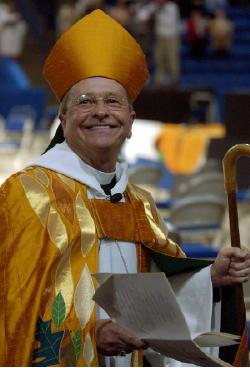Issue Date: November 14, 2003
Episcopalians, facing schism, consecrate first openly gay bishop By KEVIN ECKSTROM A gay priest at the center of an international controversy was consecrated as the first openly gay bishop in the Episcopal church Nov. 2, a move that opponents called a “plunge into unrighteousness” that will fracture the church. The Rev. V. Gene Robinson was ordained the next bishop of New Hampshire in a stately ceremony that drew more than 2,500 spectators. Robinson, 56, has served as a priest here for 28 years and as the diocese’s No. 2 official for 15 years. “It’s not about me,” an emotional Robinson said after being presented with the symbols of his office by his family, including his partner of 14 years, Mark Andrew. “It’s about so many other people who find themselves at the margins. ... Your presence here is a welcome sign for those people to be brought into the center.” The three-hour ceremony included an opportunity -- much like a wedding -- for objections to be heard. Suffragan Bishop David Bena of Albany, N.Y., spoke on behalf of 36 U.S. and Canadian bishops. “It is impossible to affirm a candidate for bishop and symbol of unity whose very consecration is dividing the whole Anglican communion,” Bena said. He called Robinson’s “chosen lifestyle ... incompatible with scripture and the teaching of this church.” Meredith Harwood, a New Hampshire parishioner, was one of seven objectors who urged the church not to “take this plunge into unrighteousness.” “The Anglican communion is a sacred gift which has been entrusted to us,” she said. “How dare this diocese rend asunder that which God has joined together?” The church’s presiding bishop, Frank T. Griswold, noted the objections but moved quickly to proceed, saying the concerns are well-known and have already been discussed. Most bishops’ elections draw little attention outside their dioceses, but Robinson has been the subject of intense scrutiny since his election in June and confirmation by church delegates and bishops in August. Indeed, the 38 leaders of the Anglican communion -- which includes 2.3 million Episcopalians in the United States -- warned two weeks ago that Robinson’s consecration threatens to “tear the fabric of our communion at its deepest level.” Bishop Douglas Theuner, the state’s current bishop who will retire next March, told Robinson, “Because of who you are, Gene, you will stand as a symbol of unity in the church in a way none of us can.” Robinson will officially take charge of the 16,475-member diocese on March 7, 2004. Now that Robinson is a sitting member of the church’s House of Bishops, the backlash promised by conservatives seems all but inevitable. Opponents, led by the American Anglican Council, have already started to withhold their money and have drafted “guidelines” for evangelical parishes that want guidance and authority from bishops beyond their dioceses. At a rally last month in Dallas, some 2,700 conservative dissidents said the church is now “under God’s judgment” for twin votes to confirm Robinson and to “acknowledge” the blessing of same-sex unions as part of the church’s “common life.” “We are turning our backs on God and violating the plain teaching of scripture,” said the Rev. Kendall Harmon of South Carolina, who was scheduled to lead a competing protest service at an evangelical church two miles away. Harmon said “at least half” of the primates, or leaders, of the 38 autonomous churches in the Anglican communion would sever formal ties with the U.S. church and refuse to receive Communion with Griswold. In a statement, the leader of the 77 million-member communion, Archbishop Rowan Williams, said the U.S. church had “acted in good faith” but called the divisions “a matter of deep regret.” “They will be all too visible in the fact that it will not be possible for Gene Robinson’s ministry as a bishop to be accepted in every province in the communion,” he said. Some Granite State parishioners, however, seemed unfazed by the controversy surrounding their new bishop. “For most people, it doesn’t matter what his sexual orientation is. It’s more who he is,” said Nancy Hawkins, a member of the Church of Our Savior in Milford, N.H. Under heavy security, Robinson was ushered to a makeshift altar inside the University of New Hampshire’s ice hockey rink by a 30-minute procession of more than 40 bishops and hundreds of clergy. Outside the arena, a small band of protesters holding “God Hates Fags” signs traded barbs with a crowd of several hundred campus supporters. The consecration was concelebrated by seven bishops, including retired Suffragan Bishop Barbara Harris of Massachusetts, whose 1989 ordination as the church’s first woman bishop also stirred threats of schism. After receiving the symbols of his office -- brilliant gold and green vestments, a shepherd’s staff, bishop’s ring and miter -- Robinson acknowledged the divisions that have erupted over his consecration. “There are people -- faithful, wonderful, Christian people -- for whom this is a moment of great pain, confusion and anger,” Robinson said. “They must know that if they must leave, they will always be welcomed back into our fellowship.”
National Catholic Reporter, November 14, 2003 |
